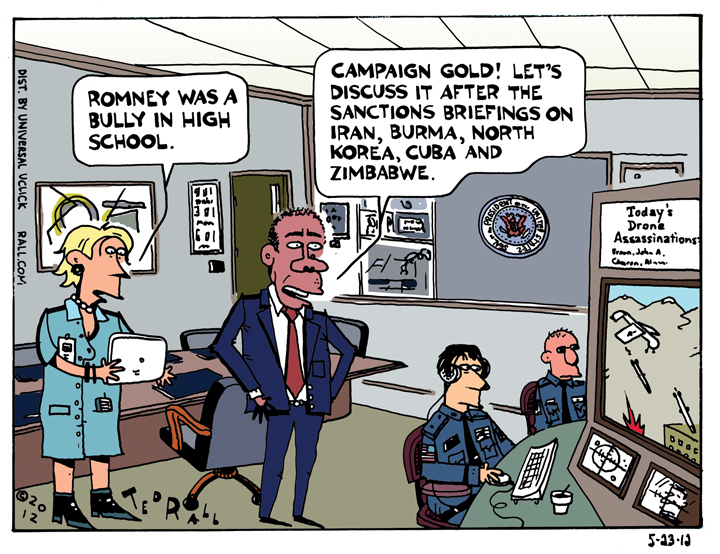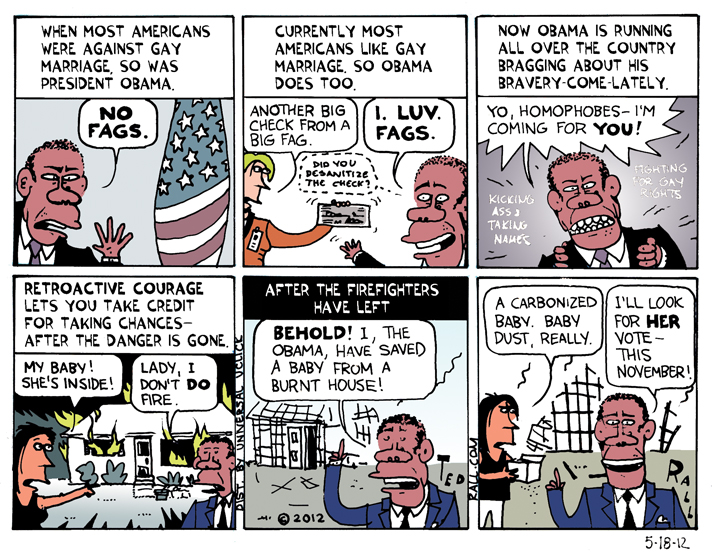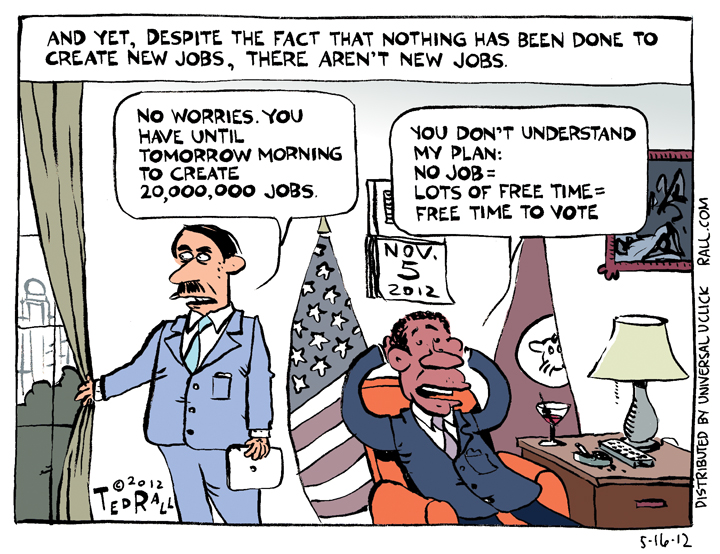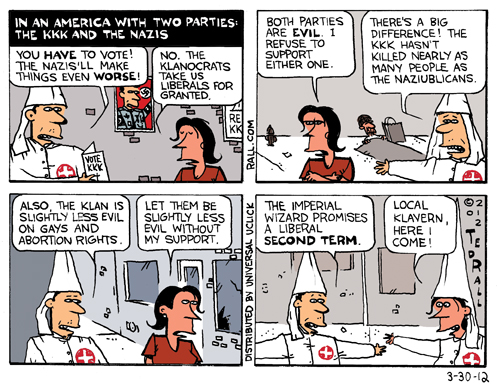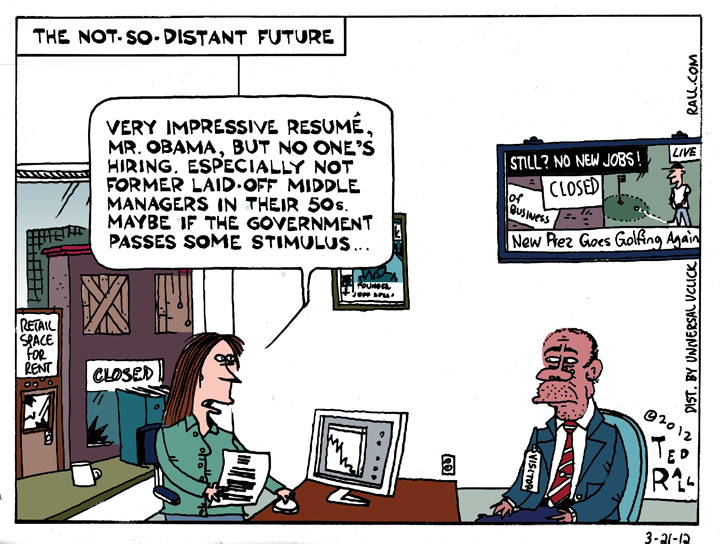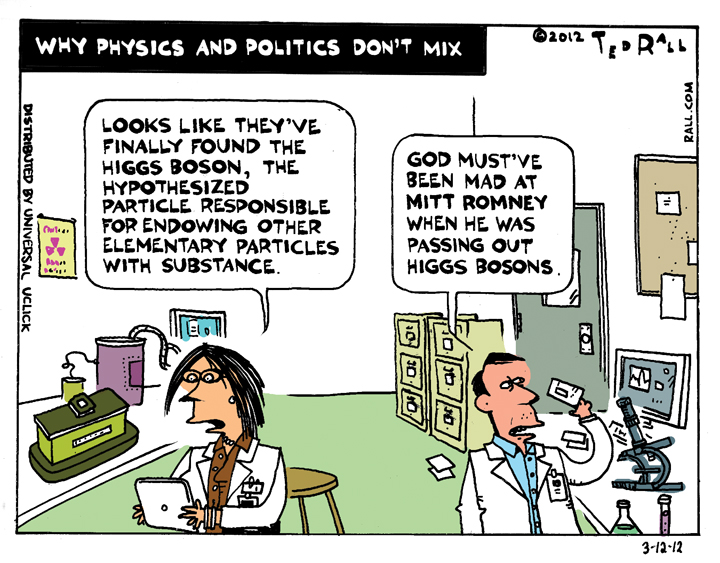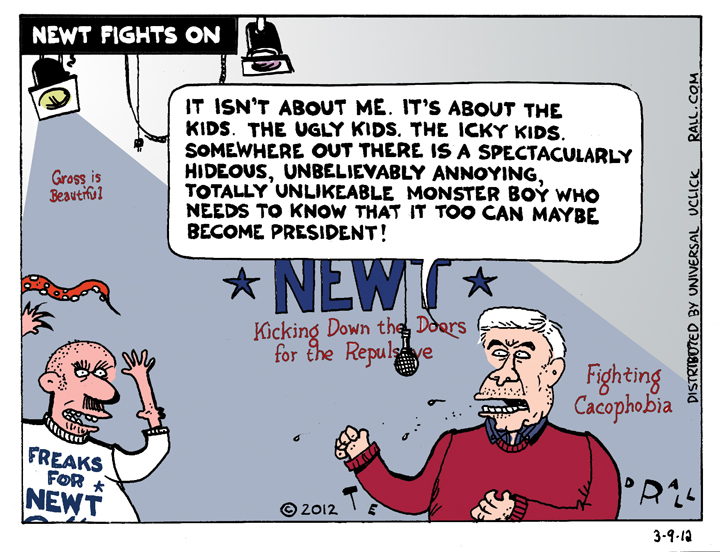Mitt Romney, the Washington Post alleges, bullied a boy he thought was gay. The Obama campaign stands to benefitâbut let he who has not bullied cast the first set of sanctions cast the first Hellfire missile.
SYNDICATED COLUMN: Leading From the Back
Obama Accepts 21st Century View of Gay Marriage
In the BDSM world the phrase “topping from the bottom” means conditional submission: when the sub questions or disobeys the instructions of his or her dom. Subverting the submissive role defeats the whole purpose of a BDSM relationship; it is thus frowned upon.
President Obama frequently engages in the political equivalent: leading from the back.
True leaders lead. They declare what society needs and tells it what it should want. Leaders anticipate what is possible. They open the space where long-held dreams intersect with current reality, allowing progress. “Do not go where the path may lead; go instead where there is no path and leave a trail,” Emerson advised.
The role of a leader has been clearly defined since the first time a member of a clan convinced his tribe they should follow him if they wanted to find more food. So why has it been so long since we Americans had real one?
In recent decades we have had two kinds of political leaders, bullies and followers. Beginning with Nixon but more so with Reagan and George W. Bush, Republican presidents have been bullies. Unwilling or unable to achieve the consensus of the majority for their radical agendas, they got what they wanted by any means necessary—corrupting the electoral process, lying, smearing opponents, and fear-mongering.
The Democrats—Carter, Clinton, and Obama—have been followers, and thus far less effectual. Leaders from the back.
Carter was the proto-triangulator, tacking right as a hawk on the Soviet invasion of Afghanistan and the Iran hostage crisis, while ignoring his liberal supporters. Clinton famously relied on toe-sucking Machiavellian pollster Dick Morris to develop stances and market memes that synced up exactly with public opinion on micro mini wedge issues. Both men left office without any major accomplishments—unless you count their sellouts to the Right (beginning “Reagan”‘s defense build-up, NAFTA, welfare reform).
Obama’s decision to come out in favor of gay marriage is classic Morris-style “leading from the back.”
“Public support for same-sex marriage is growing at a pace that surprises even professional pollsters as older generations of voters who tend to be strongly opposed are supplanted by younger ones who are just as strongly in favor,” notes The New York Times. “Same-sex couples are featured in some of the most popular shows on television, without controversy.”
No wonder: the latest Pew Research poll shows that 47 percent of voters support gay marriage, versus 43 percent against. (Among swing voters—of more interest to the Obama campaign—support is 47-to-39 percent in favor.)
“I believe marriage is between a man and a woman. I am not in favor of gay marriage,” Obama said days before the 2008 election. At that time, Americans were running 40-to-56 percent against allowing same-sex couples to wed.
I can’t read his mind, but I bet Obama was OK with gay marriage in 2008. Like most other educated people. Cynically and wrongly, he sided with anti-gay bigots because he thought it would help him win.
The president’s change of ideological heart was painfully awkward. “I have hesitated on gay marriage in part because I thought that civil unions would be sufficient,” he told ABC. “I was sensitive to the fact that for a lot of people the word ‘marriage’ was something that invokes very powerful traditions, religious beliefs and so forth.”
But now that’s changed, he said. “It is important for me personally to go ahead and affirm that same-sex couples should be able to get married.”
If Obama was a real leader, he wouldn’t care about offending “a lot of people”—i.e., right-wing homophobes. He would have gotten out front of the issue four years ago, when it mattered. The truth is, Vice President Joe Biden’s unscripted remarks a few days ago forced the issue.
Maybe Biden has the makings of a leader.
Six states and the District of Columbia have legalized gay weddings. True, the president’s statement may hasten the demise of the vile Defense of Marriage Act, which blocks federal recognition of gay marriage (and which Obama’s Justice Department defended in June 2009). But it comes too late to be meaningful.
Gay marriage was a historical inevitability before Obama spoke.
That hasn’t changed.
“For thousands of supporters who donated, canvassed and phone-banked to help elect Barack Obama, this is a powerful reminder of why we felt so passionately about this president in the first place,” said Michael Keegan, president of People for the American Way, a pro-Democratic Party interest group.
Maybe so. I don’t see it that way. I see a nation that led itself on this issue. The public debated and thought and finally, at long last, concluded that gays and lesbians deserve equal treatment before the law.
Obama didn’t lead us. We led him.
So tell me—what good is he, exactly?
(Ted Rall’s next book is “The Book of Obama: How We Went From Hope and Change to the Age of Revolt,” out May 22. His website is tedrall.com.)
SYNDICATED COLUMN: A President Who Doesn’t Even Try
Is Obama Kowtowing to the Right? Or Is He One of Them?
The President’s progressive critics blame him for continuing and expanding upon his Republican predecessor’s policies. His supporters point to the obstructionist, Republican-controlled Congress. What can Obama do? He’s being stymied at every turn.
The first problem with the it’s-the-GOP’s-fault defense is that it asks voters to suffer short-term memory loss. In 2009, you probably recall, Democrats controlled both houses of Congress. By a sizeable majority. They even had a filibuster-proof 60-seat majority in the Senate. His approval ratings were through the roof; even many Republicans who had voted against him took a liking to him. The media, in his pocket, wondered aloud whether the Republican Party could ever recover. “Rarely, if ever, has a President entered office with so much political wind at his back,” Tim Carney wrote for the Evans-Novak Political Report shortly after the inauguration.
If Obama had wanted to pursue a progressive agenda—banning foreclosures, jailing bankers, closing Guantánamo, stopping the wars, pushing for the public option he promised in his healthcare plan—he could have. He had ample political capital, yet chose not to spend it.
Now that Congress is controlled by a Republican Party in thrall to its radical-right Tea Party faction, it is indeed true that Obama can’t get routine judicial appointments approved, much less navigate the passage of legislation. Oh-so-conveniently, Obama has turned into a liberal-come-lately. Where was his proposed Buffett Rule (which would require millionaires with huge investment income to pay the same percentage rate as middle-class families) in 2009, when it might have stood a chance of passage?
Team Obama’s attempt to shore up his liberal base also falls short on the facts. Progressives were shocked by the U.S. Supreme Court’s 5-4 ruling, along party lines, that legalized strip-searches and body cavity rapes by police and private security firms who detain people suspected of any crime, even minor traffic infractions.
“What virtually none of this…commentary mentioned,” reported Glenn Greenwald in Salon, “was that that the Obama DOJ [Department of Justice] formally urged Court to reach the conclusion it reached…this is yet another case, in a long line, where the Obama administration was able to have its preferred policies judicially endorsed by getting right-wing judges to embrace them.”
No wonder Obama stayed mum.
Which brings us to the biggest, yet least discussed, flaw in the attempt to pin Obama’s inaction on the heads of Congressional Republicans: the bully pulpit.
Whether Donald Trump likes it or not, Barack Obama is still president. If he calls a press conference to call attention to an issue, odds are that reporters will show up. But he’s not walking tall or even talking big.
Responding to fall 2011 polls that indicated softening support among the younger and more liberal voters who form the Democratic base, Obama’s reelection strategists began rolling out speeches inflected with Occupy-inspired rhetoric about class warfare and trying to make sure all Americans “get a fair shot.” But that’s all it is: talk. And small talk at that.
Instead of introducing major legislation, the White House plans to spend 2012 issuing presidential orders about symbolic, minor issues.
Repeating Clinton-era triangulation and micro-mini issues doesn’t look like a smart reelection strategy. The Associated Press reported: “Obama’s election year retreat from legislative fights means this term will end without significant progress on two of his 2008 campaign promises: comprehensive immigration reform and closing the military prison for terrorist suspects at Guantánamo Bay, Cuba. Piecemeal presidential directives are unlikely to make a sizeable dent in the nation’s 8.6 percent unemployment rate or lead to significant improvements in the economy, the top concern for many voters and the issue on which Republican candidates are most likely to criticize Obama. In focusing on small-bore executive actions rather than ambitious legislation, the president risks appearing to be putting election-year strategy ahead of economic action at a time when millions of Americans are still out of work.”
Of course, Obama may prevail. Romney is an extraordinarily weak opponent.
For progressives and leftists, however, the main point is that Obama never tries to move the mainstream of ideological discourse to the left.
Obama has been mostly silent on the biggest issue of our time, income inequality and the rapid growth of the American underclass. He hasn’t said much about the environment or climate change, the most serious problem we face—and one for which the U.S. bears a disproportionate share of the blame. Even on issues where he was blocked by Congress, such as when Republicans prohibited the use of public funds to transport Gitmo detainees to the U.S. for trials, he zipped his lips.
It isn’t hard to imagine a president launching media-friendly crusades against poverty or global warming. FDR and LBJ did it, touring the country, appointing high-profile commissions and inviting prominent guests to the White House to draw attention to issues they cared about.
In 2010, Venezuelan President Hugo Chávez invited flood victims to move into his presidential palace. Seven years after Katrina, Gulf Coast residents are still waiting for help. What if Obama opened up the Lincoln Bedroom to a homeless family? The media couldn’t ignore a PR stunt like that.
Obama has mostly shunned the time-honored strategy of trapping your opposition by forcing them vote against your popular ideas. In 2009, for example, it would have been smarter politics—and better governance—to push for real socialized medicine, or at least ObamaCare with the public option he promised. He would either have wound up with a dazzling triumph, or a glorious defeat.
Liberals don’t blame Obama for not winning. They blame him for not trying. When he does crazy things like authorizing the assassinations of U.S. citizens without trial, progressives have to ask themselves: Is this guy kowtowing to the Right? Or is he one of them?
(Ted Rall’s next book is “The Book of Obama: How We Went From Hope and Change to the Age of Revolt,” out May 22. His website is tedrall.com.)
SYNDICATED COLUMN: Handicapped
Conventional Wisdom Is Wrong. It’s Romney’s To Lose.
Catching Barack Obama in a rare moment of candor, an open mic found the president confiding to his Russian counterpart that he expects to win this fall. “This is my last election,” he told Russian President Dmitry Medvedev.
Last, yes. But I wouldn’t bet on Obama winning.
The corporate pundit class has largely conceded the general election to Obama, already looking ahead to 2016. The mainstreamers have their reasons. Their analysis is based on good, solid, reasonable (inside the box) logic. All things considered, however, I would (and have) put my money on Mitt Romney this fall.
This isn’t wishful thinking. I voted for Obama last time and wanted him to succeed. He failed. His accomplishments have been few and have amounted to sellouts to the right. Even so, the prospect of watching Mitt Romney move into the White House fills me with as much joy as an appointment for a colonoscopy. And I think he’s going to win.
For me, the D vs. R horserace is a parlor game with minor ramifications for our daily lives. Whichever corporate party wins, unemployment and underemployment will continue to worsen, income disparity will widen, and most of our taxes will fund the worst approach to international affairs since a former Austrian corporal blew out his brains out in a bunker under Berlin.
Thanks to the Occupy movement, real politics is back where it belongs—in the streets. That’s what I’ll be watching and working. With a lot of luck (and even more pepper spray) this will be a year of revolution rather than more electoral devolution.
Revolution is inevitable. But we don’t know when it’s coming. So the 2012 campaign may still matter. Besides, handicapping elections is a game I enjoy and am good at. During 17 years of syndication my pick to win has only lost once (for the 2004 Democratic nomination). So, on the off chance that you’re one of those who still cares about our husk of a democracy, who hangs on every meaningless development of a political process devoid of politics—or you’re just a betting person, here’s my thinking.
Barring an assassination or a scandal, Mitt Romney will be the Republican nominee.
Obama currently leads Romney by about four to five points. But that’s not nearly enough of a lead to carry him to November. History shows that Republican nominees steadily increase in popularity throughout the summer and fall of an election year.
In April 2004, for example, John Kerry led George W. Bush by eight points. But Swift Boating erased that lead, and then some.
In order to win, a successful Democratic nominee has to begin with a big margin. That early lead must be large enough to wind up in the black, after months of being whittled away, when the votes get counted in November. I can’t see Obama pulling far enough ahead soon.
Incumbency is a huge advantage. If the election were held tomorrow, Obama would prevail. But the election is not being held tomorrow. It’s being held in November.
By the time they head to the polls this fall, voters’ brains will be drowning in months of hundreds of millions of dollars of slick, demographically targeted, pro-Romney attack ads. Republican campaigns are more effective at this sort of thing, and as Newt Gingrich and Rick Santorum can attest, Romney’s consultants pull no punches. Obama’s current lead will be a faded memory.
Every political campaign comes down to a contest of narratives. In 2008 Obama developed an effective sales pitch: Hope and Change for a nation exhausted by eight years of Bush, 9/11, war, taking off your shoes at the airport, and a full-fledged global economic crisis to boot. Obama’s advisers turned his biggest weaknesses—his inexperience, race, unusual name and foreign background—into assets. Here was a new kind of president. Just the guy to lead us out of the Bad Old Days into something better. McCain-Palin’s narrative—a cranky old ex-POW paired with a zany housewife-gone-wild—didn’t stand a chance.
This year the narratives favor Romney.
Romney is already pointing to the biggest issue on people’s minds, the economy, and claiming that his background as a turnaround artist qualifies him to fix what ails us. His prescriptions are Republican boilerplate, vague and counterproductive, but at least he’s doing something Obama hasn’t—talking a lot about creating jobs. Voters prefer useless attentiveness to calm, steady golfing (Obama’s approach). And—despite its illogic—they like the run-government-like-a-business narrative (c.f. Ross Perot, the Bushes).
Obama is boxed in by three-plus years of inaction on, well, pretty much everything. He’ll argue that he’ll be able to “finish the job” during a second term, but that’s a tough sell when you haven’t tried to start the job—in 2009, when Democrats had huge majorities in both houses of Congress. His single signature accomplishment, healthcare reform, is disliked by two-thirds of the electorate. The recent “good news” on the economy has been either insignificant (net positive job creation of 100,000 per month for two months, less than one-tenth of one percent of the 25 million jobs needed) or falsified (discouraged workers no longer counted as unemployed).
Despite what Obama tells them, Americans know things are still getting worse. Similarly, Obama’s recent, feeble, impotent rhetorical attempts to shore up his support among his Democratic Party’s disappointed liberal base will probably not generate enough enthusiasm to counter other factors that favor Romney.
You can’t vote for the first African-American president twice. Unless he picks a woman as vice president, a vote for Obama will be a vote for the same-old, same-old. The history-making thrill is gone.
At this writing the Republican Party appears to be in disarray. No doubt, Romney is emerging from the primaries battered and bruised. His awkward and demented soundbite stylings (“corporations are people,” “the trees are the right height”) will provide fodder for countless YouTube parodies. But Romney hasn’t been damaged as much as the official political class seems to think.
Republicans are a remarkably loyal bunch. United by their many hatreds (liberals, blacks, gays, poor people, Mexicans, Muslims, foreigners, etc.), they will set aside their comparatively low simmer of anti-Mormon bigotry this fall. Picking a standard-issue white Anglo Christianist thug as veep will cinch the deal.
The GOP enjoys a huge fundraising advantage, especially via the new-fangled SuperPACs. Romney has raised $74 million against $151 million for Obama, but look for that ratio to flip after he locks up the nomination. Cue those vicious, potent ads mentioned above.
About the only major factor working for Obama is the presidential debates. Romney doesn’t stand a chance against the cool, articulate Obama.
Of course, it’s a long way to November. A lot can happen. It’s very possible for Obama to win. But that’s not how it looks now.
(Ted Rall’s next book is “The Book of Obama: How We Went From Hope and Change to the Age of Revolt,” out May 22. His website is tedrall.com.)
Why Physics and Politics Don’t Mix
Scientists claim to have finally isolated the long-hypothesized Higgs Boson, a particular responsible for endowing other elementary particles with mass. Which gives us an opportunity to, as many editorial cartoonists do, blend two completely unrelated news stories into an awkward cartoon about contemporary politics.

